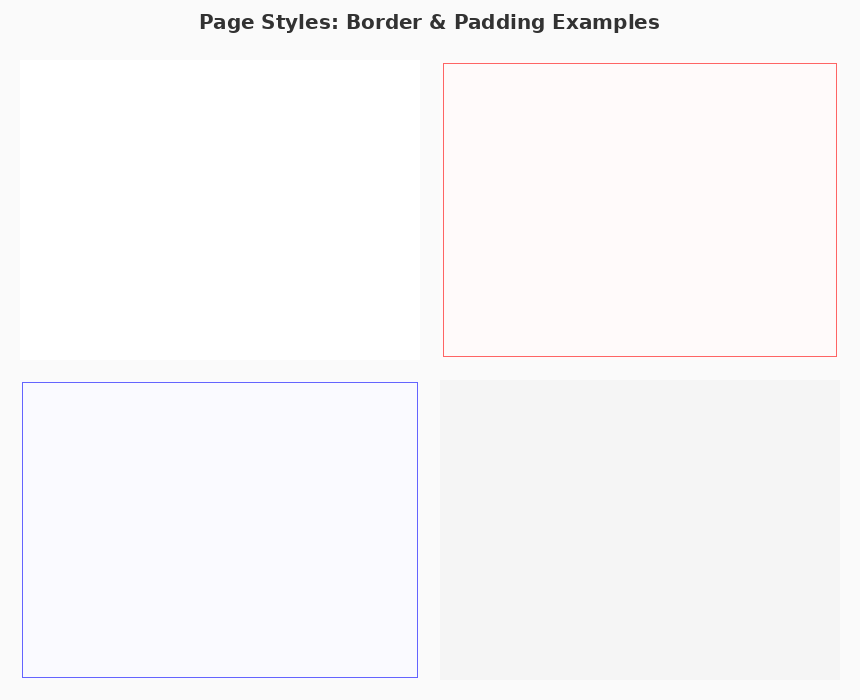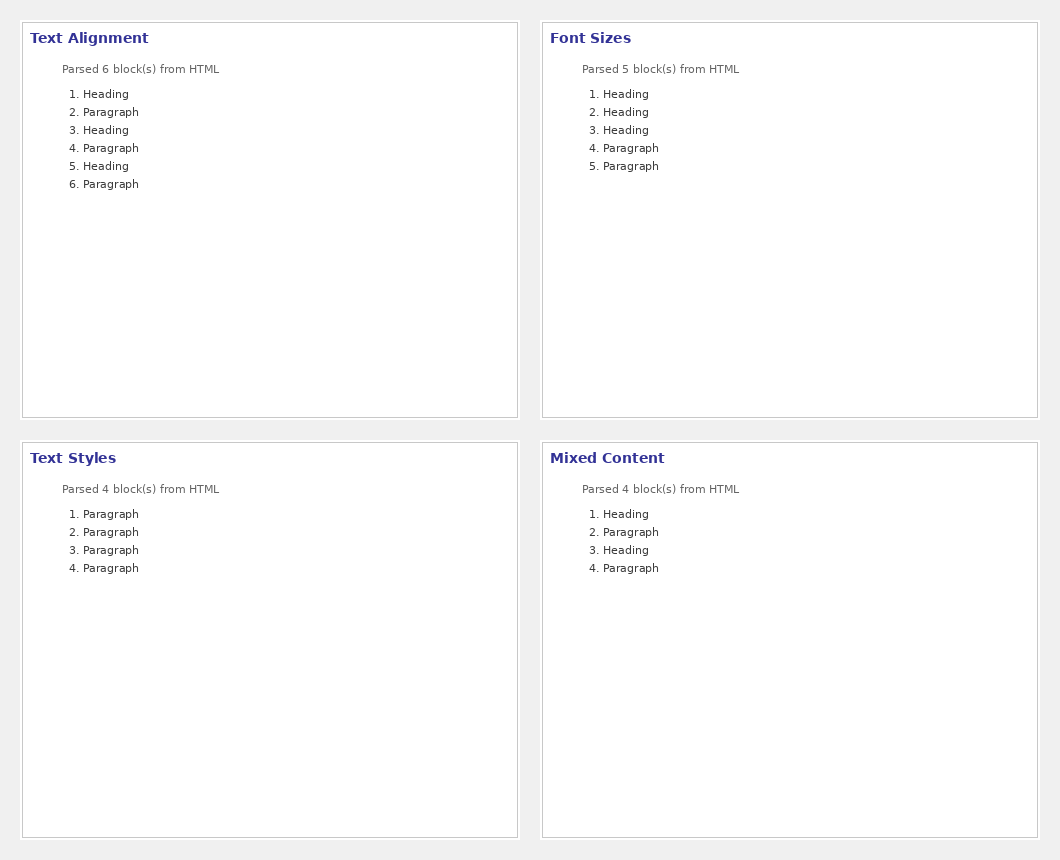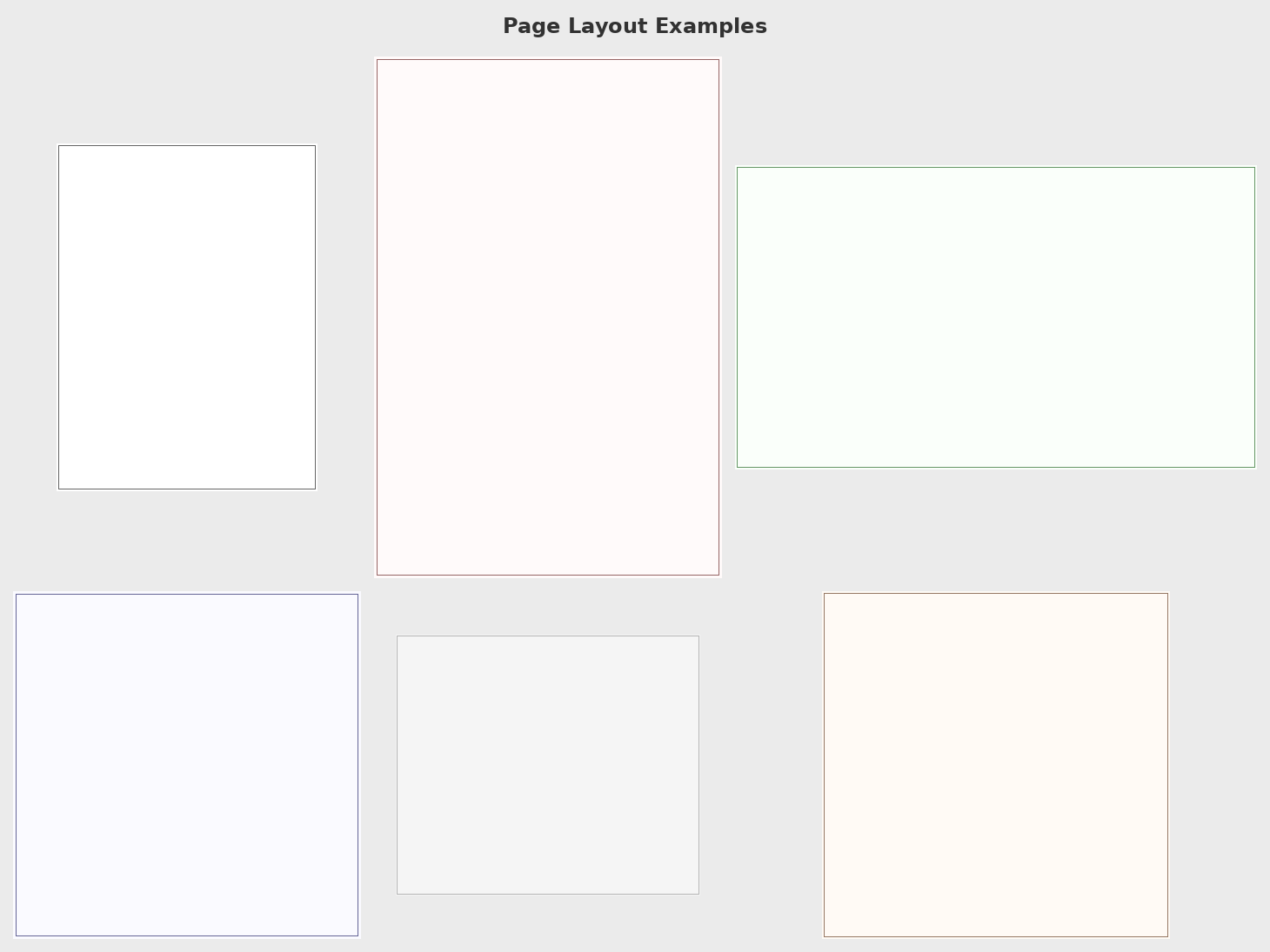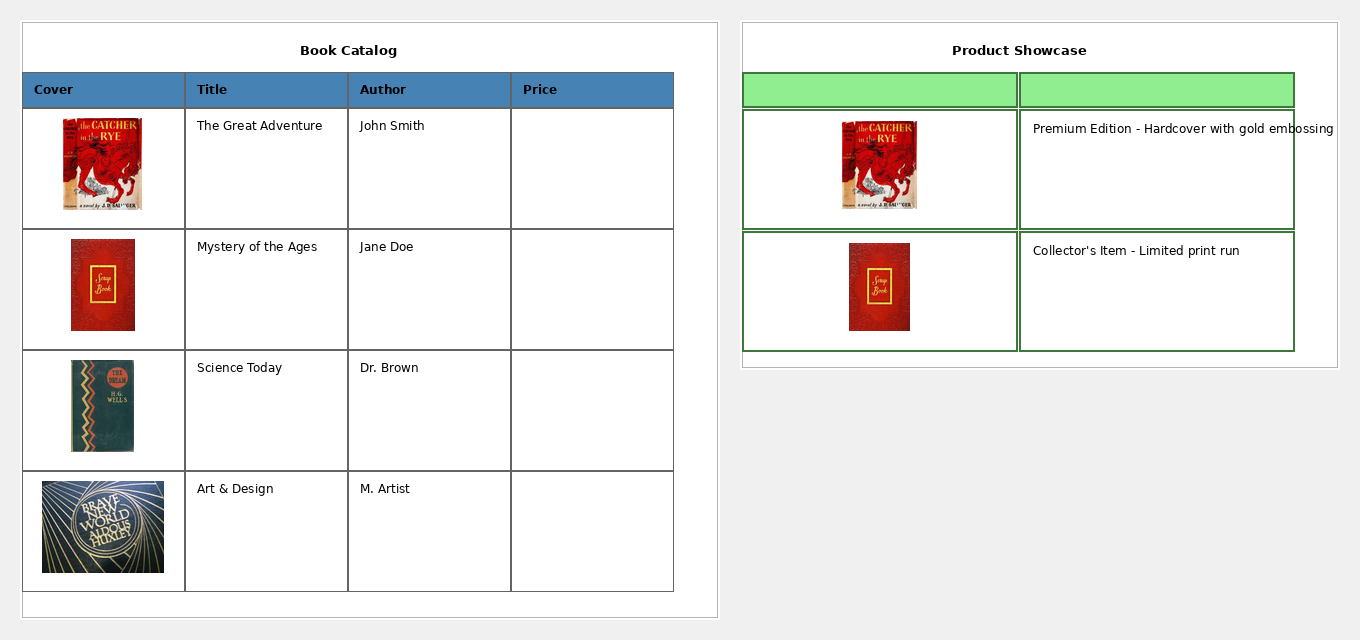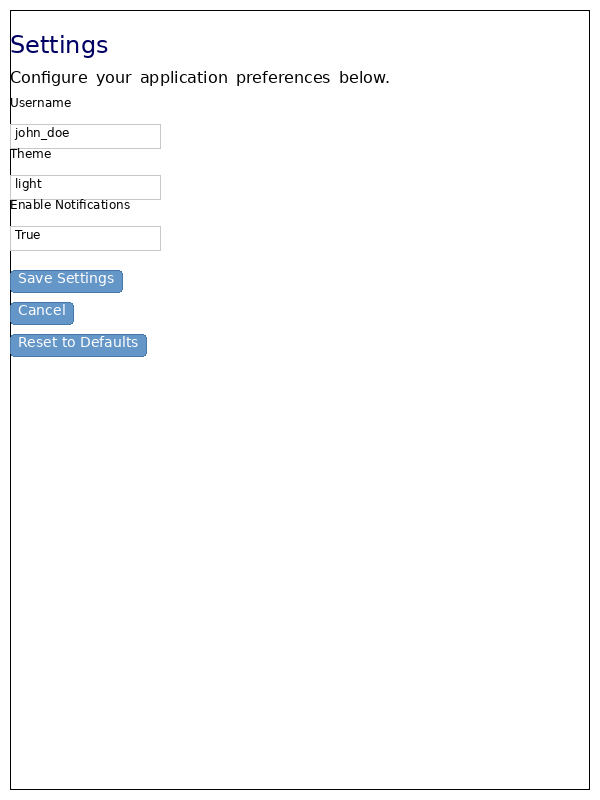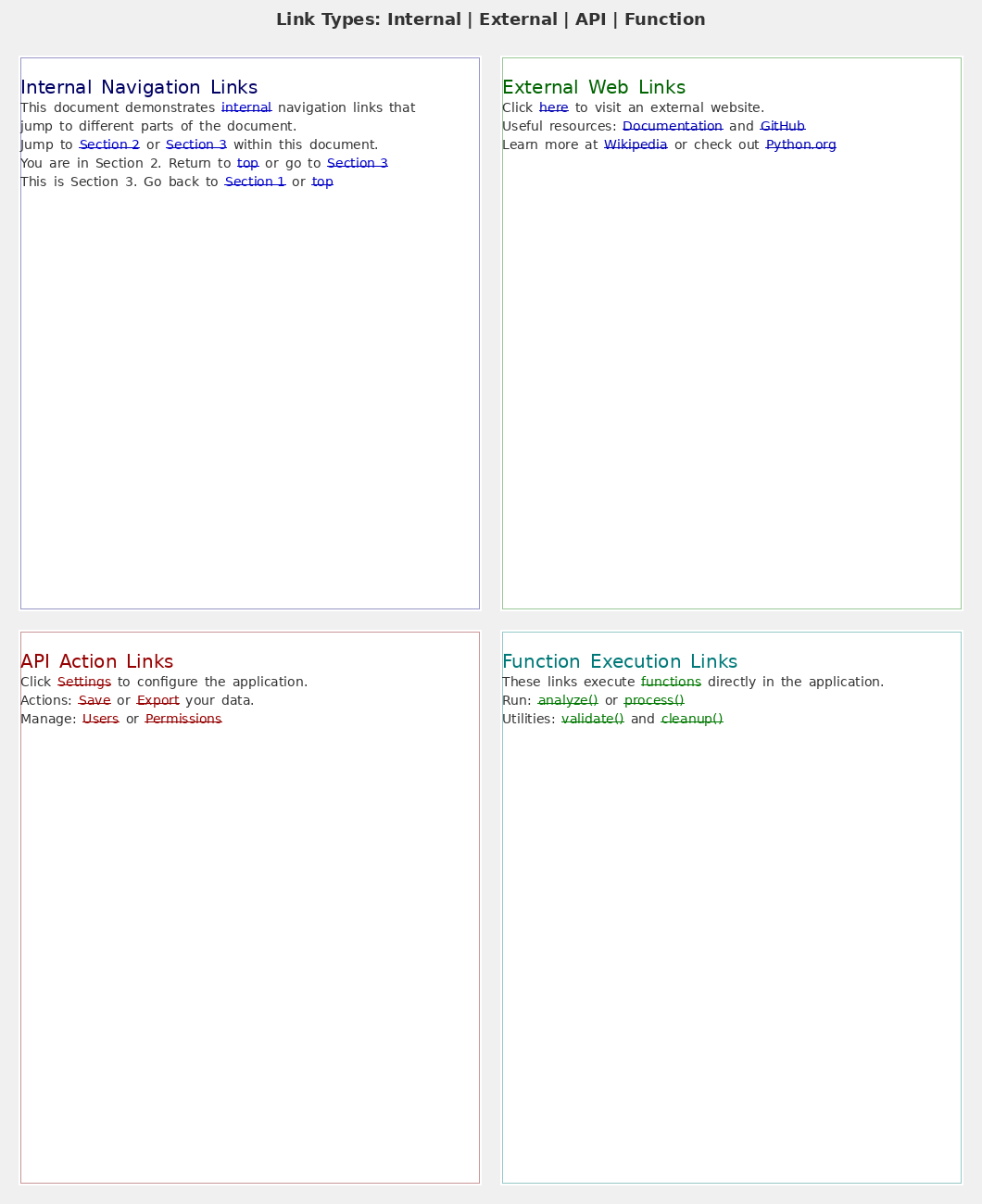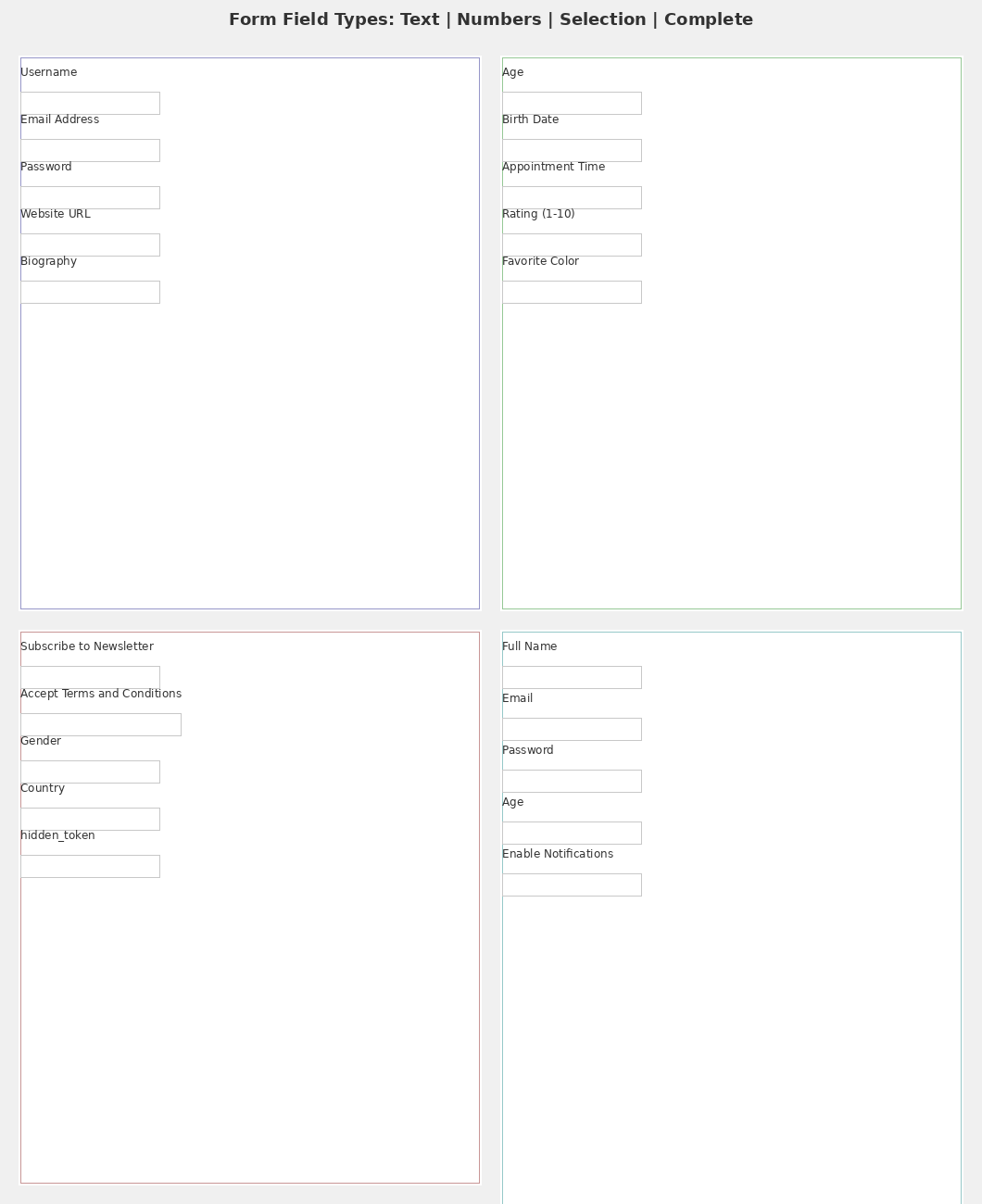6.6 KiB
PyWebLayout Examples
This directory contains example scripts demonstrating the pyWebLayout library.
Getting Started Examples
These examples demonstrate the core rendering capabilities of pyWebLayout:
01. Simple Page Rendering
01_simple_page_rendering.py - Introduction to the Page system
python 01_simple_page_rendering.py
Demonstrates:
- Creating pages with different styles
- Setting borders, padding, and backgrounds
- Understanding page layout structure
- Basic rendering to images
02. Text and Layout
02_text_and_layout.py - HTML parsing and text rendering
python 02_text_and_layout.py
Demonstrates:
- Parsing HTML content
- Text alignment options
- Font sizes and styles
- Document structure
03. Page Layouts
03_page_layouts.py - Different page configurations
python 03_page_layouts.py
Demonstrates:
- Various page sizes (portrait, landscape, square)
- Different aspect ratios
- Border and padding variations
- Color schemes
04. Table Rendering
04_table_rendering.py - HTML table rendering with styling
python 04_table_rendering.py
Demonstrates:
- Rendering HTML tables
- Table headers and body rows
- Cell borders and padding
- Caption support
- Custom table styling
05. Tables with Images
05_table_with_images.py - Tables containing images and mixed content
python 05_table_with_images.py
Demonstrates:
- Creating tables programmatically
- Adding images to table cells
- Book catalog and product showcase tables
- Mixed content (images and text) in cells
- Using cover images from test data
06. Functional Elements (Interactive)
06_functional_elements_demo.py - Interactive buttons and forms with callbacks
python 06_functional_elements_demo.py
Demonstrates:
- Creating interactive buttons
- Building forms with multiple field types
- Post-layout callback binding
- CallbackRegistry system for managing interactables
- Accessing application state from callbacks
- Batch callback operations
- Simulating user interactions
🆕 New Examples (2024-11)
These examples address critical coverage gaps and demonstrate advanced features:
08. Pagination with PageBreak (NEW) ✅
08_pagination_demo.py - Multi-page documents with explicit and automatic pagination
python 08_pagination_demo.py
Test Coverage: tests/examples/test_08_pagination_demo.py - 11 tests
Demonstrates:
- Using
PageBreakto force content onto new pages - Multi-page document layout with explicit breaks
- Automatic pagination when content overflows
- Page numbering functionality
- Document flow control
- Combining pages into vertical strips
Coverage Impact: Fills critical gap - PageBreak layouter had NO examples before this!
09. Link Navigation (NEW) ✅
09_link_navigation_demo.py - All link types and interactive navigation
python 09_link_navigation_demo.py
Test Coverage: tests/examples/test_09_link_navigation_demo.py - 10 tests
Demonstrates:
- Internal links - Document navigation (
#section1,#section2) - External links - Web URLs (
https://example.com) - API links - API endpoints (
/api/settings,/api/save) - Function links - Direct function calls (
calculate(),process()) - Link styling (underlined, color-coded by type)
- Link callbacks and interactivity
- Mixed text and link paragraphs
Coverage Impact: Comprehensive - All 4 LinkType variations demonstrated!
10. Comprehensive Forms (NEW) ✅
10_forms_demo.py - All 14 form field types with validation
python 10_forms_demo.py
Test Coverage: tests/examples/test_10_forms_demo.py - 9 tests
Demonstrates all 14 FormFieldType variations:
Text-Based Fields:
- TEXT, EMAIL, PASSWORD, URL, TEXTAREA
Number/Date/Time Fields:
- NUMBER, DATE, TIME, RANGE, COLOR
Selection Fields:
- CHECKBOX, RADIO, SELECT, HIDDEN
Coverage Impact: Complete - All 14 field types across 4 practical form examples!
Advanced Examples
HTML Rendering
These examples demonstrate rendering HTML content to multi-page layouts:
html_line_breaking_demo.py - Basic HTML line breaking demonstration
html_multipage_simple.py - Simple single-page HTML rendering
html_multipage_demo_final.py - Complete multi-page HTML rendering with headers/footers
For detailed information about HTML rendering, see README_HTML_MULTIPAGE.md.
Running the Examples
All examples can be run directly from the examples directory:
cd examples
# Getting Started
python 01_simple_page_rendering.py
python 02_text_and_layout.py
python 03_page_layouts.py
python 04_table_rendering.py
python 05_table_with_images.py
python 06_functional_elements_demo.py
# NEW: Advanced Features
python 08_pagination_demo.py # Multi-page documents
python 09_link_navigation_demo.py # All link types
python 10_forms_demo.py # All form field types
Output images are saved to the docs/images/ directory.
Running Tests
All new examples (08, 09, 10) include comprehensive test coverage:
# Run all example tests
python -m pytest tests/examples/ -v
# Run specific test file
python -m pytest tests/examples/test_08_pagination_demo.py -v
python -m pytest tests/examples/test_09_link_navigation_demo.py -v
python -m pytest tests/examples/test_10_forms_demo.py -v
Total Test Coverage: 30 tests (11 + 10 + 9), all passing ✅
Additional Documentation
README_HTML_MULTIPAGE.md- HTML multi-page rendering guide../ARCHITECTURE.md- Detailed explanation of the Abstract/Concrete architecture../docs/images/README.md- Visual documentation index with all examples../pyWebLayout/layout/README_EREADER_API.md- EbookReader API reference
Debug/Development Scripts
Low-level debug and rendering scripts have been moved to the scripts/ directory.
